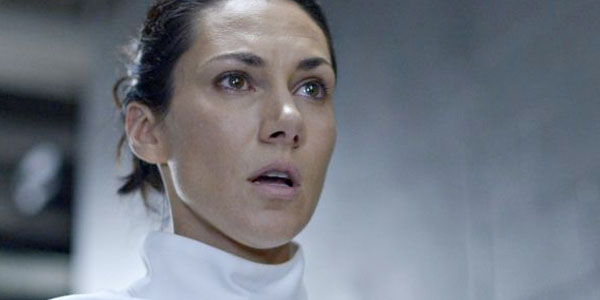TV Review: Helix 1.3, "274"

rating: 4
Helix is intriguing because it's unfolding gradually, perhaps a bit too much so at some points, but also because it's hinting at big ideas. "274" reminded viewers Helix is as much a horror show as it is science fiction. The shots of Julia's violent attack inter-cut among her scene of private recovery as well as her hallucinated transformation early in the episode suggest this series is looking to unsettle as much as it is to entice. The content of the show so far dangerous science, ominous, above-the-law corporations, ulterior motives, interpersonal strife is comprised of ideas that could be boring or gratuitous in lesser writers and directors hands. Thankfully the first three episodes have a consistency of style which suggests not only pretty packaging but also something of substance contained therein. The big question I'm left with after "274" though is whether Helix will simulate fear no easy feat of course or will it truly evoke it? The difference is that of lasting power. A roller coaster may scare you but when you get off the ride and walk on solid ground you once more feel safe and secure. Read too much H.P. Lovecraft, however, and no matter where you walk or with whom you'll be questioning your very sanity. Since the virus was briefly suggested in the pilot as having ancient origins, and considering the fact that mystery is clearly such a central conceit of the series, I can't help but think of Lovecraftian horror as the standard by which Helix wishes to be measured. I didn't walk away from this episode questioning my sanity, but its characters certainly seem to be, and I'm hoping that in addition to this development we'll see something that hasn't been done to death on TV. Consider Peter seemingly turning himself in. Acting as the first "vector" he's been attacking and spreading the volatile virus among the staff of Atlantic Biosystems. Though we've seen him and other vectors behave much like paranoid schizophrenics and snarling monsters, he's also exhibited strategic planning as evidenced by the gruesome removal of a denizen's hand to gain access to the facility's populace. Could his apparent surrender be more strategic maneuvering? The acts of the infected scientist who was later shot to death after turning her self in pleading for help certainly suggest the resignation could simply be a Trojan horse. But this theory suggests only so many outcomes: that the virus is part of an alien invasion, something which doesn't seem like a fit for the show's aesthetic or themes; that the virus was engineered by some careful hand and is carrying out some as yet to be revealed character, a more apt possibility; or that perhaps those ancient Lovecraftian origins will see the virus become not merely the new smallpox, but the beginning of the end of all humanity. This may sound over-the-top, but among that, vague conspiracy, and alien invasion wouldn't you rather see something that hasn't been done before? I'm remaining hopeful until further episodes narrow the playing field a bit, but for now Helix is full of possibilities. In addition to the many other threads to be woven into this gooey black narrative tapestry such as Hatake's shiny eyes and the mysterious white room, "274" also introduced the scar on Sarah's back and the genome sequence's critical mass incident. While these visuals are nifty cues to hopefully be picked up on later, basics such as solid character development can't be forgotten. I loved Julia's monologue and the jump cuts which heightened the tension she was feeling when pouring her heart out to a heavily sedated Peter, and I'm enjoying seeing Sarah prove her worth beyond a pretty face. Hatake's apparent obsession with Julia is something I'm curious about and though I'm not blown away by any of the characters yet none of them have irritated or confounded me, which is definitely a good sign. It's easy to be hopeful for a series when it's only three episode in, but so far Helix is giving its viewers more to be optimistic for than wary of.